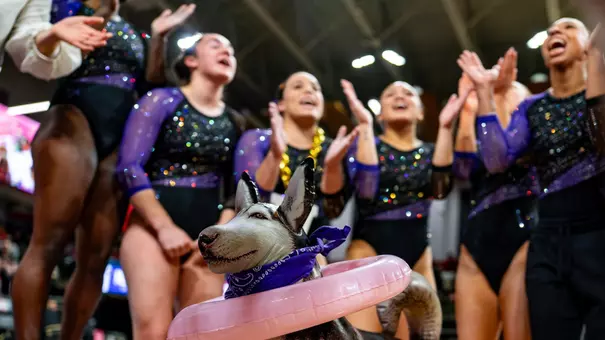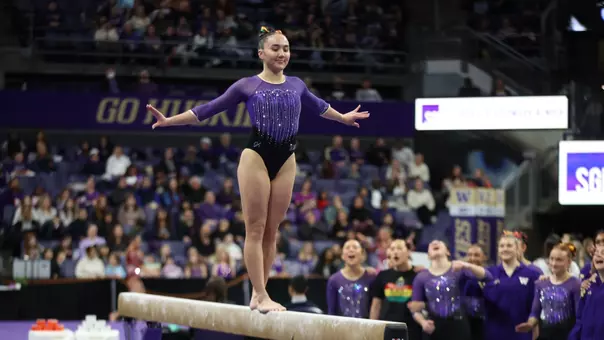
Mental Training A Huge Factor In Success Of GymDawgs
March 29, 2013 | Gymnastics
March 29, 2013
By: Jocelyn Perry
SEATTLE -
Being a college athlete is physically demanding. Hours of practicing, lifting weights, rehabbing injuries, traveling and attending classes can take its toll on a young adult. Keeping the body going under these circumstances is not easy; it requires adequate sleep and a healthy diet among other things.
However, being strong physically and having the technical skills in your sport is not the only thing you need to be successful.
The mental aspect plays just as an important role in preparing for competition and life.
While every student-athlete on the Washington campus uses some sort of mental training, the Husky gymnastics team works hard to implement mental cues and techniques into its daily routine.
Sports Psychologist Dr. Ron Chamberlainhas been at Washington since 2011 and works with every sport team on campus. Every Monday morning he heads to the practice gym at Alaska Airlines Arena and hosts a session with the GymDawgs to get them mentally prepared for the week.
"I like how Coach Bowers has it set up this year," said Dr. Chamberlain. "It gives us a good opportunity to look back at the past week and see if there is anything we need to talk about as a group. We talk about weekly goals. Gymnasts take the opportunity to see what they want to focus on for the week. It gives us an opportunity at the end of the meeting to talk about the end goal which is the team competing at Nationals. It is a good reminder each week, so we're very critical about reminding them what their goals are and how they are going to work towards it."
While the gymnastics coaches focus on perfecting technical skills into the gymnasts, Dr. Chamberlain helps each athlete look at their training and competition from a broader perspective. This allows the gymnasts to break down their big goal into week-to-week accomplishments.
Gymnastics is unique because it is very individual. When an athlete is competing, it's just her and the apparatus with everyone watching. The moment each gymnast is about to salute the judge, there is nothing more she can do to physically prepare herself. The coaches and the gymnasts have worked hard preparing up until this point, so the gymnast needs to trust her training.
One training technique coaches use for competition is called "pressure sets." The coaches and gymnasts simulate the upcoming meet and by putting competitors into pressure situations. The coaches might try to distract a gymnast on beam by yelling at her, or if a gymnast misses her routine they might make everyone else redo theirs.
"Our phrase is `practice like you're going to compete, then compete like you practice,'" said Dr. Chamberlain. "The goal is for each gymnast to focus on only herself and her routine, blocking out any distractions."
Dr. Chamberlain equates the pre-routine mentality to students entering an exam room.
"People come in with flashcards and review notes one more time and try to cram it in, and that's probably the worst thing you can do," he said. "Are you really going to remember those last few seconds when you're anxious? You're much better off putting it away for the last five minutes and do some relaxing and breathing exercises."
Like students about to take an exam, athletes also need to relax the body and calm the mind in order to be successful. It is important in gymnastics because each athlete needs to focus on her own routine for the success of the team.
"I cheer for everyone but I try not to focus on everyone else," said McKenzie Fechter. "I know I will hit my routine no matter what. It doesn't matter who goes before or after me, all that matters is myself at that moment. And I can't let anything bother me because then I'm not doing my job and I need to focus on myself."
To become relaxed and calm, Dr. Chamberlain encourages calming self talk, positive images, taking deep breaths, getting out of their heads and talking to their teammates. These tools help athletes curb anxiety and find a better mental state before competition.
Performance anxiety is a combination of fear, self-doubt, and pressure. In gymnastics, performance anxiety is not from the meet, it's what each gymnast is telling herself before she competes. Dr. Chamberlain and the coaching staff work with each gymnast to help them internalize concepts, which the gymnasts zero in their focus right before their routines.
Beam coach Elise Ray has incorporated more mental cues into training and routines this season. Each movement on the beam is associated with a mental cue, both skills and movements.
"Each gymnast has to be completely focused for 1:30," said Ray. "Usually when you see a wobble or a fall is when the gymnast lost that mental focus."
Ray asked each gymnast to come up with three words to motivate her and exemplify how she wants to look and feel.
"I've been asking them before they mount what those three words are. And then I try to encourage them to embody those words," Ray said.
Their three words before they mount might be "confidence, focused and fierce." During the routine, mental cues can be "technical," to remind the gymnast to push with her legs or swing her arms. And when they are dancing, Ray encourages with "I am..." confirmations such as "I am confident" or "I am focused."
"Before one skill I like to think 'collected' or 'one thing at a time,'" said freshman Sheridan Metcalf. "Then I just go through the motions. I can't overthink it when I'm under pressure."
As a sophomore, Fechter has a year of collegiate gymnastics experience and she knows what feelings she's going to get before she competes.
"I've started to figure out how to control my feelings this year," said Fechter. "I'm working on trusting everything and going big. Sometimes you forget the little details, like hitting a handstand. My new mind frame is training like an anchor on every event. Expect to be good."
People tend to associate sports psychology as a useful tool when athletes are having slumps, but it also helps when athletes are having successes.
"Successful experiences build confidence," said Dr. Chamberlain. "The mind doesn't tell the difference between what is real and what is vividly imagined. So you have a positive experience and you go home and visualize that multiple times, now you didn't have one success, you've had 10 successes. That's a great confidence boost."
These tools Dr. Chamberlain teaches the GymDawgs and other student-athletes aren't solely for competition. Everyone can use these strategies to become better and develop healthier ways of thinking in all aspects of life.
"What we've learned about all these topics that we've read and talked about have come from people who have been successful over and over again in many different sports," said Dr. Chamberlain. "So we take those aspects and we say these people have been successful so we know it works. So now the matter is how do we internalize it and utilize it and benefit from it? This isn't just sports psychology; this is the psychology of success. What can you do to be happier? What can you do to be more productive? Have better relationships? That's what I love about this.
"These concepts apply across the board. It's about functioning well in life."











